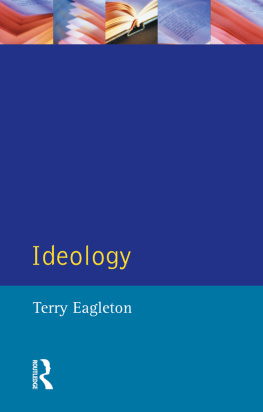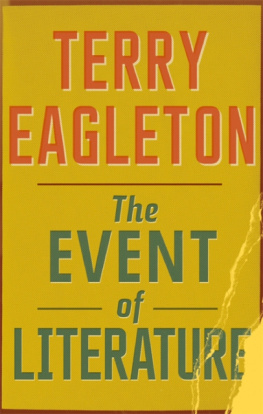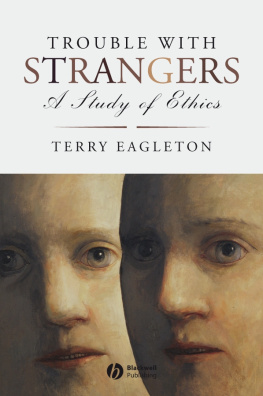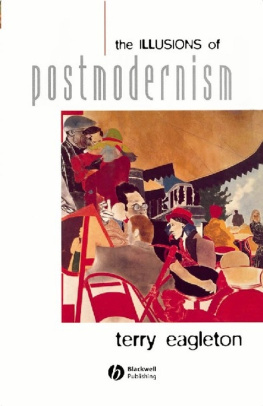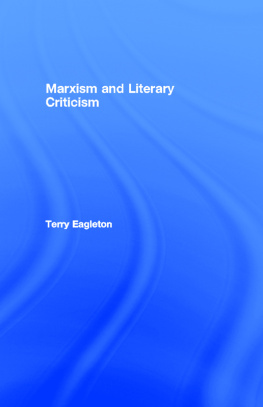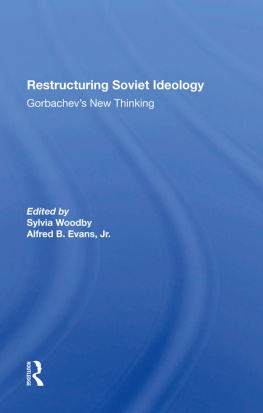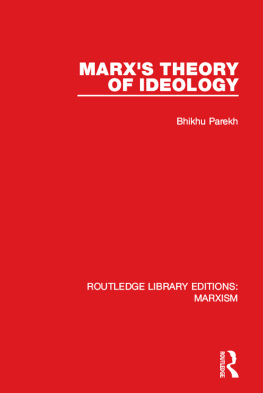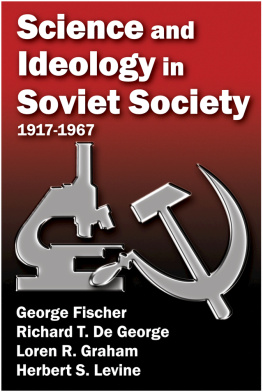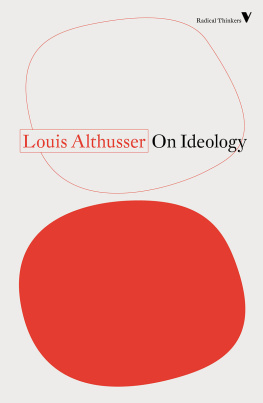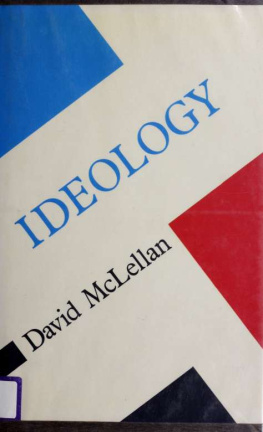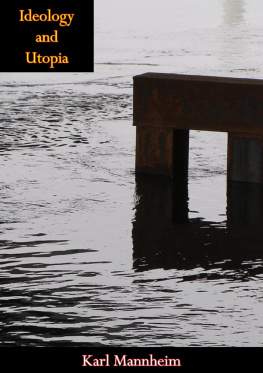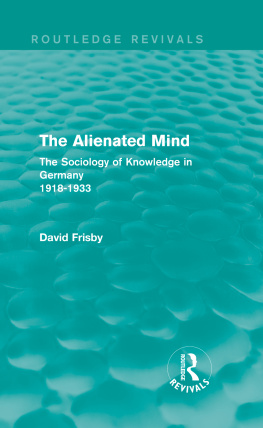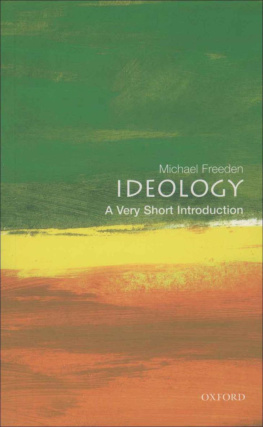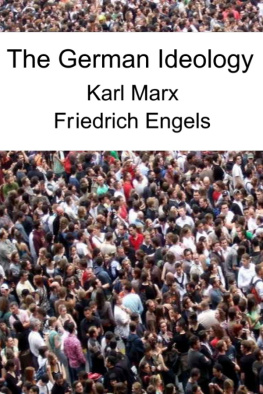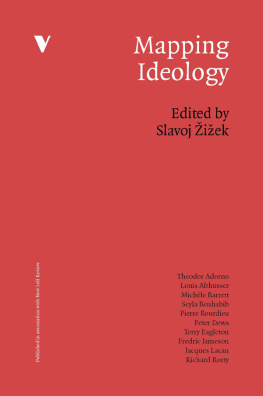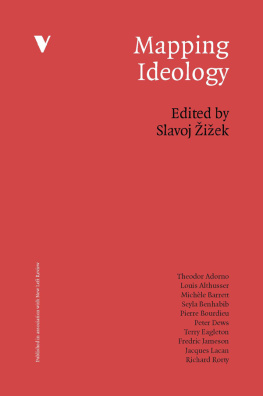IDEOLOGY
LONGMAN CRITICAL READERS
General Editor:
STAN SMITH, Professor of English, University of Dundee
Published titles:
K.M. NEWTON, George Eliot
MARY EAGLETON, Feminist Literary Criticism
GARY WALLER, Shakespeares Comedies
JOHN DRAKAKIS, Shakespearean Tragedy
RICHARD WILSON AND RICHARD DUTTON, New Historicism and Renaissance Drama
PETER BROOKER, Modernism/Postmodernism
PETER WIDDOWSON, D. H. Lawrence
RACHEL BOWLBY, Virginia Woolf
FRANCIS MULHERN, Contemporary Marxist Literary Criticism
ANNABEL PATTERSON, John Milton
CYNTHIA CHASE, Romanticism
MICHAEL ONEILL, Shelley
STEPHANIE TRIGG, Medieval English Poetry
ANTONY EASTHOPE, Contemporary Film Theory
TERRY EAGLETON, Ideology
IDEOLOGY

Edited and Introduced by
TERRY EAGLETON

First published 1994 by Pearson Education Limited
Third impression 1999
Published 2013 by Routledge
2 Park Square, Milton Park, Abingdon, Oxon OX14 4RN
711 Third Avenue, New York, NY 10017, USA
Routledge is an imprint of the Taylor & Francis Group, an informa business
Copyright 1994, Taylor & Francis.
All rights reserved. No part of this book may be reprinted or reproduced or utilised in any form or by any electronic, mechanical, or other means, now known or hereafter invented, including photocopying and recording, or in any information storage or retrieval system, without permission in writing from the publishers.
Notices
Knowledge and best practice in this field are constantly changing. As new research and experience broaden our understanding, changes in research methods, professional practices, or medical treatment may become necessary.
Practitioners and researchers must always rely on their own experience and knowledge in evaluating and using any information, methods, compounds, or experiments described herein. In using such information or methods they should be mindful of their own safety and the safety of others, including parties for whom they have a professional responsibility.
To the fullest extent of the law, neither the Publisher nor the authors, contributors, or editors, assume any liability for any injury and/or damage to persons or property as a matter of products liability, negligence or otherwise, or from any use or operation of any methods, products, instructions, or ideas contained in the material herein.
ISBN 13: 978-0-582-23716-2 (pbk)
British Library Cataloguing in Publication Data
A catalogue record for this book is available from the British Library
Library of Congress Cataloging-in-Publication Data
Ideology / edited and introduced by Terry Eagleton.
p. cm. (Longman critical readers)
Includes bibliographical references and index.
ISBN 0-582-23715-7. ISBN 0-582-23716-5 (pbk.)
1. Ideology. I. Eagleton, Terry, 1943- II. Series.
B823.3.I346
The outlines of contemporary critical theory are now often taught as a standard feature of a degree in literary studies. The development of particular theories has seen a thorough transformation of literary criticism. For example, Marxist and Foucauldian theories have revolutionised Shakespeare studies, and deconstruction has led to a complete reassessment of Romantic poetry. Feminist criticism has left scarcely any period of literature unaffected by its searching critiques. Teachers of literary studies can no longer fall back on a standardised, received, methodology.
Lecturers and teachers are now urgently looking for guidance in a rapidly changing critical environment. They need help in understanding the latest revisions in literary theory, and especially in grasping the practical effects of the new theories in the form of theoretically sensitised new readings. A number of volumes in the series anthologise important essays on particular theories. However, in order to grasp the full implications and possible uses of particular theories it is essential to see them put to work. This series provides substantial volumes of new readings, presented in an accessible form and with a significant amount of editorial guidance.
Each volume includes a substantial introduction which explores the theoretical issues and conflicts embodied in the essays selected and locates areas of disagreement between positions. The pluralism of theories has to be put on the agenda of literary studies. We can no longer pretend that we all tacitly accept the same practices in literary studies. Neither is a laissez-faire attitude any longer tenable. Literature departments need to go beyond the mere toleration of theoretical differences: it is not enough merely to agree to differ; they need actually to stage the differences openly. The volumes in this series all attempt to dramatise the differences, not necessarily with a view to resolving them but in order to foreground the choices presented by different theories or to argue for a particular route through the impasses the differences present.
The theory revolution has had real effects. It has loosened the grip of traditional empiricist and romantic assumptions about language and literature. It is not always clear what is being proposed as the new agenda for literary studies, and indeed the very notion of literature is questioned by the post-structuralist strain in theory. However, the uncertainties and obscurities of contemporary theories appear much less worrying when we see what the best critics have been able to do with them in practice. This series aims to disseminate the best of recent criticism and to show that it is possible to re-read the canonical texts of literature in new and challenging ways.
RAMAN SELDEN AND STAN SMITH
The Publishers and fellow Series Editor regret to record that Raman Selden died after a short illness in May 1991 at the age of fifty-three. Ray Selden was a fine scholar and a lovely man. All those he has worked with will remember him with much affection and respect.
We are grateful to the following for permission to reproduce copyright material:
Basil Blackwell Ltd for Ideology by Jurgen Habermas from Interpretations of Marx edited by Tom Bottomore (Oxford: Basil Blackwell, 1988) pp. 299309, Marxism & Literary History by Professor John Frow from Marxism and Literary History (Oxford: Basil Blackwell, 1986) pp. 627, Belief, Bias and Ideology by Jon Elster from Rationality and Relativism edited by Martin Hollis and Steven Lukes (Oxford: Bail Blackwell, 1982) pp. 123148; Cambridge University Press and the author for Ideology by Raymond Cuess from The Idea of a Critical Theory pp. 422; Janet Walker Gouldner for Ideological Discourse as Rationality and False Consciousness from The Dialectic of Ideology and Technology by the late Alvin Gouldner (London: Macmillan, 1976); Harper Collins Ltd for Fontana and the editor, Professor David E. Apter for Ideology as a Cultural System by Clifford Geertz from both The Interpretation of Cultures (Fontana) pp. 208233 and Ideology and Discontent edited by D. Apter (Copyright 1964 by The Free Press of Glencoe a division of Macmillan & Co) pp. 4756; The Macmillan Press Ltd for Problems and Advances in the Theory of Ideology from On Law and Ideology by Paul Hirst (London: Macmillan, 1979) pp. 2939; the author, John Mepham and the editor of
Next page
